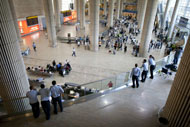
On a recent trip to Washington DC, I was stunned by two things: the first was by just how many DCers speak Arabic. The second was how obsessed US think tanks and policy makers are with the Palestinians’ September UN vote. As a Palestinian who lives smack in the middle of Palestine and is privy to the opinions of a wide range of people from civil society members to decision makers, I was surprised at how much more attention was given to the vote by Americans than even ourselves.
While I am all for Palestinians formulating a game plan for their bid for statehood in September, I am not quite sure what all the fuss is about. Palestinians want to cement the legitimacy of their claims in the corridors of the UN, something which they have so far been denied. They want the world to recognize a right that should be guaranteed to all nations, the Palestinians included. And while the leadership has tried its hand with negotiations for years and endless years, it has realized that nothing has changed, unless for the worse. But even the most optimistic Palestinian is not foolish enough to think that a magic wand will be waved at the UN in September and a Palestinian state will appear. So, I ask again, what is all the fuss about?
In a twisted, roundabout way, I can understand why Israel would oppose it. Israel has always been careful not to put its seal of approval on any sort of legitimacy for a Palestinian state, much less on whose borders are clearly designated by the 1949 armistice line. Israel is inherently opposed to a viable, contiguous and independent Palestinian state in the 22 percent of historical Palestine it occupies, and will fight tooth and nail to ensure as many allies as it can to join in its ranks.
The United States, however, is another story. While everyone understands the “special relationship” between Israel and the U.S. it is still baffling that it would stand up so adamantly against Palestinian statehood, which it officially endorses. All of the administration’s talk of not supporting “unilateral measures” from either side does not hold water given the numerous unilateral measures Israel has taken over the years without any resistance from the United States. In Washington circles, the justification is also that such a move would not be in the US’s best interests. How Palestinian statehood stands in contradiction to U.S. interests is beyond me. The only possible reason for this falls in line with analyses I heard while listening to the many “pro-peace” activists in DC about the U.S’s politics in the region, which is that the Israel issue plays as a domestic issue in American politics rather than a foreign one. For American lawmakers, there is no price to be exacted from being pro-Israel (which is synonymous with being pro American) while there is a huge price to be paid for being even moderately pro-Palestinian.
For us, there are no real surprises when it comes to the United States’ bias towards Israel. We all know that if the vote goes to the UN Security Council, the United States, along with its closest allies, will veto it, not because it is against the country’s interests of even because the U.S. is opposed to unilateral steps. It is not even because the US believes the best way to a solution is to return to the negotiating table. It is plain and simply because that is what Israel wants and the U.S. has yet to display any intention of standing up to it.
This leaves Palestinians in a bit of a bind. The one lesson that can be taken away from my DC experience is this: while there are many well-intentioned people who do believe the Palestinians deserve a state, it is naïve to believe that the U.S. will ever be the honest broker it claims to be in the Palestinian-Israeli conflict. U.S. officials can talk the nice talk or at least make fancy convoluting circles around the issue in order to avoid it, but the truth of the matter is that the United States has yet to cut the apron strings which Israel holds on to. Having said this, it is also clear that Palestinians need to get over that fear of angering the United States and moving forward either with or without them. It is time we take the power back. If a price is going to be paid, at least let us pay it with dignity.
Joharah Baker is Director of the Media and Information Department at the Palestinian Initiative for the Promotion of Global Dialogue and Democracy (MIFTAH). She can be contacted at [email protected].









